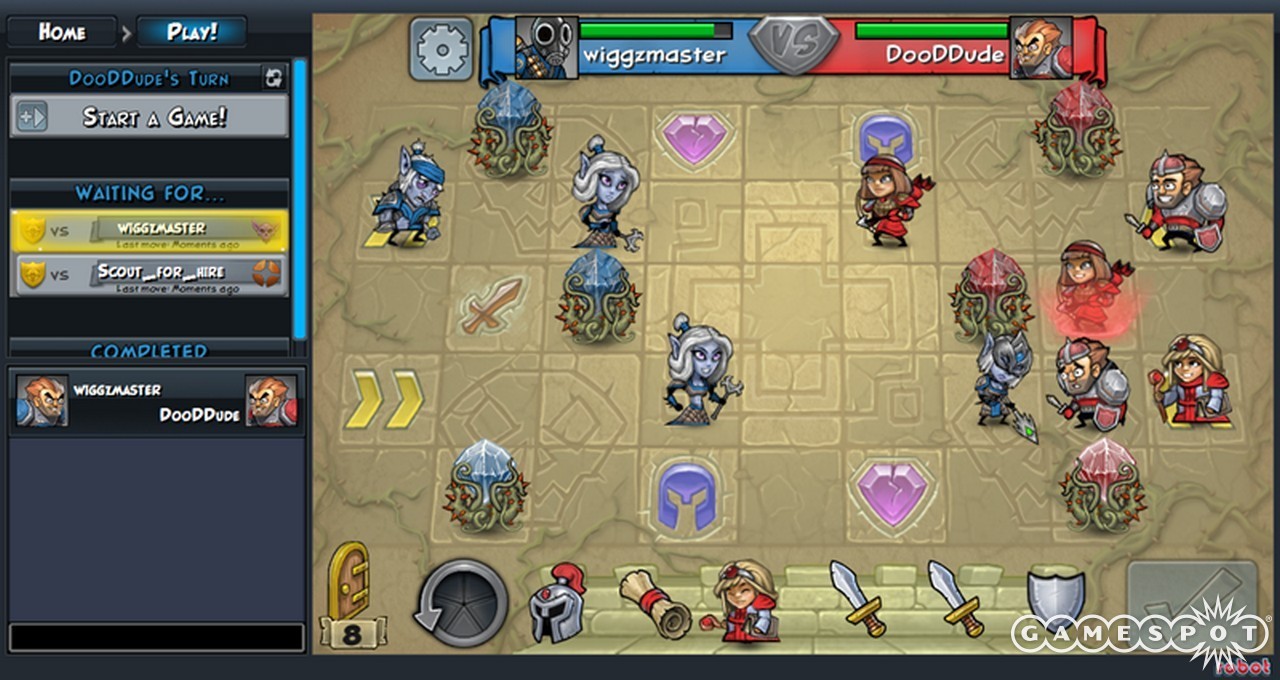A well-played game of chess can yield one of the most intense, satisfying duels you can have without firing a single shot. But it's the addition of swords, spells, rocket launchers, sniper rifles, and other crazy combat gear that injects sublime chaos into Hero Academy's chess-like matches. The goofy cartoonish clobbering that unfolds in each asynchronous multiplayer battle is cutthroat in this highly tactical game, making each encounter a gripping struggle to outsmart your opponent. Thanks to cross-platform play enabled between this PC port and the iOS original, there's never a lack of fresh foes out there to thrash.

One-off duels in Hero Academy have opposing teams taking turns plunking down troops, making strategic movements around the battlefield grid, and delivering some serious beatdowns to enemy units within range. The objective is to slaughter all of your opponent's forces or smash the crystals on their side of the grid, but the flow of combat is a lot more nuanced than simply moving around and bashing heads in. Each team can perform only five actions per round. Deploying units, moving them around, attacking, consuming items, doling out buffs, and using special abilities all cost action points. Being extremely limited in what you can do each round keeps matches moving along at a brisk pace and encourages cunning tactics.
Like in a game of chess, you have to try to think several steps ahead of your opponent to persevere. A big part of the excitement comes from watching turns play out, where you get to see the fruits of your planning unfold in all their spectacular or bumbling grandeur. A helpful option to undo and redo moves before you lock in your turn lets you test ideas before committing. The excitement builds as the advantage ebbs and flows toward an inevitable showdown with both sides using whatever remaining forces they can scrabble together at the very end.
Finite resources make careful strategizing all the more important. Your reserve of starting troops, items, and power-ups is determined completely at random, and using them draws from your overall combat pool. The element of chance this adds makes deciding what to do each round feel a lot like playing a game of cards. This can be either thrilling or infuriating, depending on what new goodies you draw each round and how useful they are at the moment. Resources dwindle as rounds progress, which effectively keeps matches from dragging on too long. Victory often hinges on how you play your final units and how quickly you can whittle away at your opponent's forces without losing your own.

The underlying gameplay structure is simple but sound, though it's the different factions that really make Hero Academy's encounters so dynamic. Each team has a distinct cartoonish visual design that stands out and a unique combat style to match. The burly, battle-hardened dwarves, for example, have units that can dish out powerful area-of-effect attacks and generate protective shields over allies. Dark elves are experts at sapping life from enemies to heal friendly units. Particularly charming is the Team Fortress 2 faction, whose perks and play style are a spot-on adaptation from the first-person shooter format. Subtle touches, such as having the heavy's mini-gun deal more damage after it spools up from subsequent attacks, really showcase the thought put into unit design, and this detailing applies to all of the factions. Every team has a mix of melee brawlers, long-range missile hurlers, healers, and support troops, but their special perks set them apart nicely. This makes it well worth shelling out $14.99 for the full version, which includes all available teams. The $4.99 base game only comes with the human and Team Fortress 2 factions, which won't cut it once you've been bitten by the battle bug.
Battles can grow complex toward mid-match when both sides have a lot of units rolled out and heavy buffs applied to strengthen their forces. Unless you stomp corpses out of existence immediately, fallen troops can be revived by healers and potions within the same round they died. This means you can wipe out a bunch of foes during your turn only to start the next round with half of them revived and back in the fray. The five-action limit keeps this from getting ridiculous. Despite the deep, sometimes agonizing strategic decision making that goes on as matches unfold, user-friendliness remains a high priority throughout the game's design. The streamlined interface is clean and accessible, plus tutorials and an in-game guide offer plenty of support to help new players learn the ropes before diving in against human opponents.

Hero Academy's asynchronous multiplayer works best when you're juggling a large number of matches at once, since it lets you play multiple teams and stave off lulls in the action. Not everyone plays at the same pace, and waiting long minutes for a sluggish player to take his or her turn stinks. And since some folks start a game and then randomly stop playing mid-match, having a healthy pool of current battles under way is crucial to a steady flow. The good news is that there's an abundance of opponents out there. Matchmaking options let you face off against random opponents, Twitter followers, Steam friends, or specific users you can search for. An omnipresent sidebar also makes tracking your games and pending turns a cinch.
With a great balance between depth and accessibility, Hero Academy is an easy game to get drawn into. Multiplayer matchmaking is an effortless process, and even if some battles fizzle, there's a thriving community of eager players to face off with. The five core factions are bursting with stylish charm and make for a diverse range of tactical fun. Prepare to get hooked on this one.